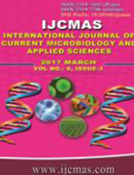


 National Academy of Agricultural Sciences (NAAS)
National Academy of Agricultural Sciences (NAAS)

|
PRINT ISSN : 2319-7692
Online ISSN : 2319-7706 Issues : 12 per year Publisher : Excellent Publishers Email : editorijcmas@gmail.com / submit@ijcmas.com Editor-in-chief: Dr.M.Prakash Index Copernicus ICV 2018: 95.39 NAAS RATING 2020: 5.38 |
A field experiment was carried out at the Research Farm, Division of Agronomy, Sher-e- Kashmir University of Agricultural Sciences and Technology, Jammu during the kharif season of 2014 to evaluate the effect of different transplanting dates and organic nutrient sources on growth and yield potential of basmati rice under system of rice intensification. The experiment consisted of three dates of transplanting and five nutrient sources. Results revealed that the transplanting of rice seedlings on June 30 produced significantly higher grain yield (33 q/ha) over July 15 (30 q/ha) and July 30 (28 q/ha) transplanting. The percent increase in grain yield with transplanting on June 30 and July 15 were in order of 18.59 and 9.71 over July 30, respectively. The application of 100% inorganic fertilizer i.e. recommended dose of fertilizer (RDF) recorded significantly higher grain yield (33 q/ha) which was statistically at par with vermicompost + FYM + neem oil cake and green manuring + vermicompost. The microbial population was found non-significant among the different date of transplanting. However, the significantly higher bacterial 4.20*(105) À and fungal 4.12*(104) À count was recorded with green manuring + Vermicompost. Whereas, significantly higher actinomycetes count 25.56*(104) was observed in treatments applied with 100% Brown manuring than 100% inorganic and FYM + vermicompost + neem oil cake but it was statistically at par with green manuring + vermicompost and Brown manuring + 25% RDF. Based on one year experiment we concluded that transplanting of rice seedling at 30 June with green manuring + Vermicompost was recorded highest yield with sustain soil environment.
 |
 |
 |
 |
 |